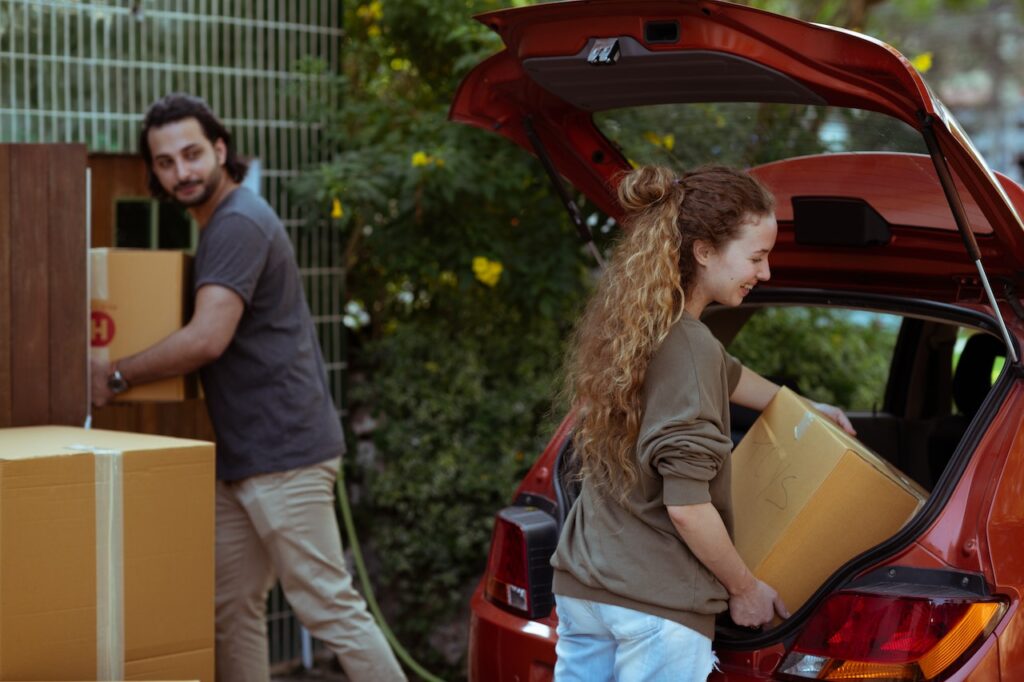
Introduction
Long-distance relationships are never easy, but they can be worth it when you’re in love. Eventually, you’ll reach a point where you and your partner want to close the gap and live in the same place. But who should move in a long-distance relationship? This article will help guide you through the decision-making process by considering essential factors, personal experiences, and helpful advice. Let’s dive in.
Understanding Long-Distance Relationship Dynamics
Challenges of Long-Distance Relationships
Long-distance relationships (LDRs) come with unique challenges. The lack of physical presence can lead to feelings of loneliness, miscommunication, and doubts about the relationship’s future. Trust and commitment are essential in maintaining a strong bond. If you need a guide on LDRs we have a great article for you on Pros and Cons of Long-Distance Relationships: A Comprehensive Guide.
Reasons for Moving in a Long-Distance Relationship
Couples in LDRs may decide to move in together for various reasons, including:
- Strengthening their emotional connection
- Reducing the financial burden of frequent visits
- Simplifying their lives by merging households
- Planning to get married or start a family
Get Professional Help from the best online couples therapy platform and it is %20 off.
Questions to Ask Before Moving
Get yourself a paper or open up your notes and start writing these questions down. You will discuss/answer all of these questions one by one with your lover for a healthy moving together. In our articles most of the times you can see the expression open communication, when it comes to the relationships this is the skill you do not wanna lack. Asking the right questions is not only important in relationships but life itself too.
Which part of moving is the hardest for you?
Knowing where you and your partner will have a bad time beforehand will make you ready to support your partner.
How can i support you during your hardest time in this moving process?
Ask for a cheatsheet from your partner, do not try to solve all by yourself. Talk about it and you will be ready when your partner is in his/her hardest time.
What are our long-term goals as a couple?
This question is important because it helps determine whether your future plans align and if moving will support those goals.
What are our individual career goals, and how will the move affect them?
Considering each partner’s career aspirations is crucial because the move should ideally support both partners’ professional development.
How will the cost of living and quality of life differ in the new location?
Understanding the financial implications of the move and the lifestyle changes it may bring will help you make a more informed decision.
Are we both willing to make compromises to ensure the success of our relationship?
This question highlights the importance of flexibility and teamwork in a relationship, especially when making significant decisions like relocating.
How will we handle family and friends’ concerns or disapproval?
This question prepares you to address any resistance from loved ones, ensuring that you maintain healthy relationships with those who are important to you.
What is our plan for handling potential homesickness or culture shock?
Discussing coping strategies in advance can help you both manage the emotional challenges of moving to a new place.
How will we divide household responsibilities and manage shared finances?
Establishing expectations early on can help prevent misunderstandings and conflicts as you adjust to living together.
What is our plan if the move doesn’t work out as expected?
This question helps ensure that you have a contingency plan in place, providing a sense of security and reducing stress.
How will we maintain our individual identities and interests after moving?
Balancing personal needs with relationship needs is essential for maintaining a healthy partnership, especially during a significant transition.
What are our expectations for spending time together and apart?
Discussing how you’ll balance your time together and your personal space can help prevent feelings of suffocation or neglect after moving.
Key Takeaways
- Long-distance relationships come with unique challenges and require trust, commitment, and open communication.
- Before deciding who should move, consider factors like career opportunities, support systems, cost of living, and personal preferences.
- Maintain open communication, compromise, and consider each partner’s needs during the decision-making process.
- Plan and budget for the move, addressing emotional challenges, legal matters, and adjusting to the new environment.
- Focus on strengthening your relationship post-move and seek support if needed.
- If moving isn’t the right decision, explore other ways to maintain and strengthen your long-distance relationship.
Crucial Factors to Consider Before Moving
Career and Job Opportunities
Moving for love means uprooting your life and possibly sacrificing your career. Before making a decision, assess the job opportunities available in the new location. Consider the potential impact on your long-term career goals and financial stability.
Support System and Social Life
Leaving behind friends and family can be difficult. Evaluate the support system you’ll have in the new location and how you’ll maintain connections with loved ones.
Cost of Living and Financial Stability
The cost of living can vary significantly between locations. Research the cost of housing, utilities, groceries, and other necessities. Determine how the move will affect your financial stability and ensure you can maintain a comfortable lifestyle.
Quality of Life and Personal Preferences
Consider the new location’s climate, culture, and amenities. Does it align with your preferences and values? Are you excited about the prospect of living there, or does it feel like a compromise?
The Decision-Making Process: Who Should Move?
Analyzing the Pros and Cons
Create a list of pros and cons for each partner moving. Consider factors like career opportunities, support systems, and personal preferences. Discuss the list openly and honestly with your partner.
Open Communication and Compromise
Effective communication is vital in reaching a fair decision. Share your thoughts, feelings, and concerns openly, and listen to your partner’s perspective. Compromise may be necessary to find the best solution for both of you.
Consider the Future of the Relationship
Think about your long-term goals as a couple. Do your plans align? This is one of the most important questions to ask yourself and discuss with your partner. Is moving a step towards a more committed relationship, or is it a temporary solution? Ensure that both partners are on the same page regarding the relationship’s future.
Gearing Up for the Move

Planning and Budgeting
Create a moving plan and budget, accounting for expenses like housing, transportation, and setting up your new home. Start saving early to alleviate financial stress.
Addressing Emotional Challenges
Leaving behind friends, family, and a familiar environment can be emotionally challenging. Seek support from your partner and loved ones, and consider seeking professional help if necessary.
Navigating Legal and Immigration Matters
If the move involves crossing international borders, research visa requirements, work permits, and other legal matters. Consult with an immigration attorney if needed.
Smoothing the Transition
Adjusting to a New Environment
Give yourself time to adapt to your new surroundings. Explore the area, make new friends, and establish routines. Maintain open communication with your partner as you both adjust to the changes.
Strengthening the Relationship Post-Move
Moving in together after a long-distance relationship can be a significant change. Continue working on your relationship by maintaining open communication, spending quality time together, and supporting each other through challenges.
The Impact of Moving on Your Relationship
The Positive Effects of Moving
Moving to be together in a long-distance relationship can bring numerous positive changes. The opportunity to spend more quality time together can deepen your emotional connection and strengthen your bond. You’ll also have the chance to create new shared experiences and memories in your new environment, fostering a stronger partnership. Additionally, moving can lead to personal growth and help you develop a greater understanding of your partner’s day-to-day life.
Potential Challenges of Moving
Relocating for a relationship can also come with challenges. You or your partner may experience feelings of homesickness, loneliness, or culture shock, especially if the move involves a significant distance or a new country. Adjusting to living together after being apart can take time, and conflicts may arise as you navigate shared responsibilities and create new routines. It’s essential to be patient, communicate openly, and support each other during this transitional period.
When Moving Isn’t the Right Decision
Sometimes, after considering all factors, moving might not be the right decision for your relationship. It’s essential to be honest with yourself and your partner about your feelings and concerns. If moving isn’t feasible, explore other ways to maintain and strengthen your long-distance relationship.
Seeking Support and Advice
The Role of Friends and Family
When making a decision about moving for a long-distance relationship, it can be helpful to consult friends and family. They can provide valuable insights, share their experiences, and offer emotional support. However, remember that every relationship is unique, and ultimately, the decision should be based on what’s best for you and your partner.
Professional Help: When to Consult a Relationship Counselor
If you find that you and your partner are struggling to reach a decision or are experiencing significant stress or conflict, consider seeking professional help. A relationship counselor can provide guidance, help you explore your feelings, and offer strategies for improving communication and decision-making. Engaging in counseling can be beneficial not only for resolving the current dilemma but also for strengthening your relationship in the long run.
Conclusion
Deciding who should move in a long-distance relationship is a complex and emotional process. By considering the factors discussed in this article, openly communicating with your partner, and weighing the pros and cons, you’ll be better equipped to make the right decision for both of you. Remember, the key to a successful relationship, whether long-distance or not, is trust, communication, and mutual support.
FAQ: Frequently Asked Questions
How do I know if it’s the right time to move in a long-distance relationship?
There is no one-size-fits-all answer to this question. It depends on your individual circumstances, the strength of your relationship, and your readiness to take this significant step. Open communication and honest discussions with your partner are crucial in determining if the timing is right.
How can we make the decision-making process fair for both partners?
Maintain open communication, share your thoughts and feelings openly, and listen to your partner’s perspective. Compromise may be necessary to find a solution that works best for both of you. Consider creating a pros and cons list for each partner moving to help guide your decision.
What if we can’t agree on who should move?
If you can’t reach an agreement, take a step back and reassess the situation. It may help to seek advice from friends, family, or a relationship counselor to gain a fresh perspective. Ultimately, the decision should be made with both partners’ best interests in mind.
How can we maintain our relationship if moving isn’t the right decision?
If moving isn’t the right decision, focus on strengthening your long-distance relationship. Regular communication, planning visits, and setting long-term goals as a couple can help maintain your connection.
How can we make the transition to living together smoother?
Open communication, establishing routines, and allowing time for adjustment are crucial when transitioning from a long-distance relationship to living together. Explore your new environment together, make new friends, and ensure you spend quality time with your partner.



